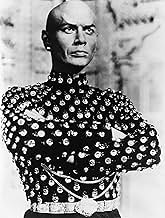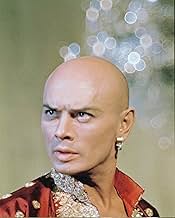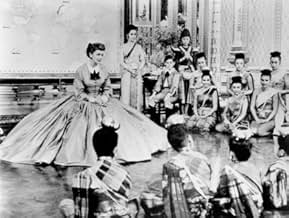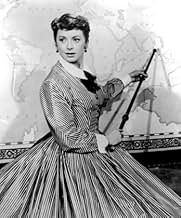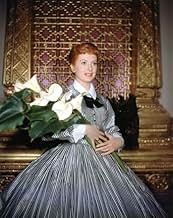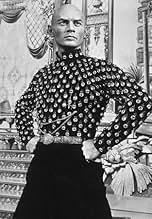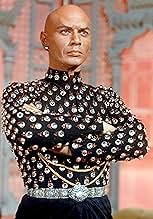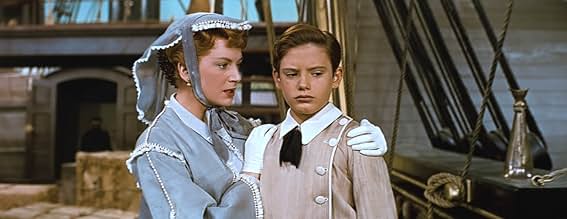VALUTAZIONE IMDb
7,4/10
28.934
LA TUA VALUTAZIONE
Una vedova accetta un lavoro come governante per i figli del re del Siam, trasferendosi nella residenza reale.Una vedova accetta un lavoro come governante per i figli del re del Siam, trasferendosi nella residenza reale.Una vedova accetta un lavoro come governante per i figli del re del Siam, trasferendosi nella residenza reale.
- Regia
- Sceneggiatura
- Star
- Vincitore di 5 Oscar
- 11 vittorie e 13 candidature totali
Robert Banas
- Keeper of the Dogs - in Play
- (non citato nei titoli originali)
Dennis Bonilla
- Mongkut's Twin Son
- (non citato nei titoli originali)
Thomas Bonilla
- Mongkut's Twin Son
- (non citato nei titoli originali)
Jerry Chien
- Royal Child
- (non citato nei titoli originali)
Nancy Chien
- Royal Child
- (non citato nei titoli originali)
Mary Lou Clifford
- Royal Wife
- (non citato nei titoli originali)
Judy Dan
- Royal Wife
- (non citato nei titoli originali)
Recensioni in evidenza
"The King and I" was a personal triumph for Yul Brynner and Gertrude Lawrence when the musical made its debut on Broadway. The king of the story seemed to be tailor-made for Mr. Brynner, who made it his signature role and returned with it to the musical theater, again and again.
As captured in film, directed by Walter Lang, "The King and I" is quite a splendid showcase for Mr. Brynner. Since Ms. Lawrence was not chosen to repeat the role of Anna that she created on the stage, her substitute was Deborah Kerr, an immensely talented actress who was a delight in any of the films she graced with her talent and charm.
As a spectacle, this movie is full of exotic colors of what Hollywood thought Siam would look like in the years where the story takes place. The film works as well because of the charismatic performance of Yul Brynner and the terrific chemistry he and Ms. Kerr projected in the film.
All the elements of a Rodgers and Hammerstein's musical are in place. The music serves the story being told. "The King and I" will charm its viewers because of the amazing impact Yul Brynner made in it.
As captured in film, directed by Walter Lang, "The King and I" is quite a splendid showcase for Mr. Brynner. Since Ms. Lawrence was not chosen to repeat the role of Anna that she created on the stage, her substitute was Deborah Kerr, an immensely talented actress who was a delight in any of the films she graced with her talent and charm.
As a spectacle, this movie is full of exotic colors of what Hollywood thought Siam would look like in the years where the story takes place. The film works as well because of the charismatic performance of Yul Brynner and the terrific chemistry he and Ms. Kerr projected in the film.
All the elements of a Rodgers and Hammerstein's musical are in place. The music serves the story being told. "The King and I" will charm its viewers because of the amazing impact Yul Brynner made in it.
Getting to know The King and I is a wonderful experience. Yul Brynner is unforgettable as the king of Siam, and Deborah Kerr is able to stand toe-to-toe (or head-to-head) with his every move. With its lavish sets, elaborate costumes, and amusing songs, this musical has an undeniable charm, even if it may feel foreign or dated to some.
The King and I has been my favorite Rodgers&Hammerstein show for many years. I love the score and the only real criticism I have of this film version is that it did not contain the entire score from the Broadway show. It also did not contain the magical performance of Gertrude Lawrence in her final role. But that was beyond the scope of 20th Century Fox and Darryl Zanuck.
The versions of The King and I that we usually see performed give emphasis to the role of the King. As Gertrude Lawrence was dying in 1952 she made a deathbed request that the billing on the show be changed and that Yul Brynner be given top billing instead of whatever female would be replacing Lawrence as Anna Leonowens. That was done and it has remained so ever since.
The role of King Mongkut of Siam became like Dracula was for Bela Lugosi, a part that no matter what else he did, Yul Brynner couldn't escape from. The air of authority he establishes as the King holds you and binds you to every move he makes in the part. I'm told that as good as this screen version is, to see him on stage was the real deal. The critical acclaim he got from the Broadway run no doubt led to him winning an Oscar as Best Actor for 1956.
Standing in for Gertrude Lawrence quite ably is Deborah Kerr who got one of her several nominations for Best Actress for this film. Unfortunately her voice is dubbed by that well known vocal stand-in Marni Nixon as is Rita Moreno as Tuptim and Carlos Rivas as Lun Tha the second romantic leads. The part does call more for an actress than a singer. Gertrude Lawrence was the very best of both.
So many popular standards come from this score, more than any other score Richard Rodgers and Oscar Hammerstein, II wrote. From philosophical tunes like Getting to Know You and I Whistle a Happy Tune and such romantic ballads as Hello Young Lovers, We Kiss in a Shadow, Something Wonderful and Shall We Dance will be done forever. Somewhere now on planet earth there is some theatrical company doing the King and I and performing these great songs. You can't also forget those that didn't make the cut here like I Have Dreamed and My Lord and Master.
The most interesting song that Dick and Oscar wrote is the solo for the King, A Puzzlement. It's very similar to the Soliliquy in Carousel where the song explains all the character motivations of Billy Bigelow. King Mongkut, a very real historic figure who wanted very much to move his country into the modern era, but his entire upbringing fights against his desire. A Puzzlement is a wonderful number that goes into the problems of governing and not just for monarchies. Listen to Hammerstein's lyrics, they are very much relevant today.
I visited Thailand in 1999 and learned a great deal about the country in those two days. King Mongkut's descendants rule today as constitutional and beloved monarchs. In fact this film which probably did more to encourage tourism to Thailand than anything else is banned in that country. Because it shows the king in what the Thais feel as an irreverent light. It is indeed a puzzlement.
The film has preserved forever one of the great Broadway shows of all time forevermore. Reason enough to see it and whistle its happy tunes.
The versions of The King and I that we usually see performed give emphasis to the role of the King. As Gertrude Lawrence was dying in 1952 she made a deathbed request that the billing on the show be changed and that Yul Brynner be given top billing instead of whatever female would be replacing Lawrence as Anna Leonowens. That was done and it has remained so ever since.
The role of King Mongkut of Siam became like Dracula was for Bela Lugosi, a part that no matter what else he did, Yul Brynner couldn't escape from. The air of authority he establishes as the King holds you and binds you to every move he makes in the part. I'm told that as good as this screen version is, to see him on stage was the real deal. The critical acclaim he got from the Broadway run no doubt led to him winning an Oscar as Best Actor for 1956.
Standing in for Gertrude Lawrence quite ably is Deborah Kerr who got one of her several nominations for Best Actress for this film. Unfortunately her voice is dubbed by that well known vocal stand-in Marni Nixon as is Rita Moreno as Tuptim and Carlos Rivas as Lun Tha the second romantic leads. The part does call more for an actress than a singer. Gertrude Lawrence was the very best of both.
So many popular standards come from this score, more than any other score Richard Rodgers and Oscar Hammerstein, II wrote. From philosophical tunes like Getting to Know You and I Whistle a Happy Tune and such romantic ballads as Hello Young Lovers, We Kiss in a Shadow, Something Wonderful and Shall We Dance will be done forever. Somewhere now on planet earth there is some theatrical company doing the King and I and performing these great songs. You can't also forget those that didn't make the cut here like I Have Dreamed and My Lord and Master.
The most interesting song that Dick and Oscar wrote is the solo for the King, A Puzzlement. It's very similar to the Soliliquy in Carousel where the song explains all the character motivations of Billy Bigelow. King Mongkut, a very real historic figure who wanted very much to move his country into the modern era, but his entire upbringing fights against his desire. A Puzzlement is a wonderful number that goes into the problems of governing and not just for monarchies. Listen to Hammerstein's lyrics, they are very much relevant today.
I visited Thailand in 1999 and learned a great deal about the country in those two days. King Mongkut's descendants rule today as constitutional and beloved monarchs. In fact this film which probably did more to encourage tourism to Thailand than anything else is banned in that country. Because it shows the king in what the Thais feel as an irreverent light. It is indeed a puzzlement.
The film has preserved forever one of the great Broadway shows of all time forevermore. Reason enough to see it and whistle its happy tunes.
10jlacerra
Having read most of the comments on this picture, I was astonished to see how little understood this classic musical is. Yes, it takes place in 19th century Siam, but it is a fairy tale Siam in the same sense as the fairy tale Paris in An American in Paris. It is not supposed to be a true representation of Asian life. Wake up, Folks! Its a Hollywood adaptation of a Broadway musical! Let's leave the realism to Phat and Foster.
This picture, with its infectious score and dynamic performances, is one of the best of its genre. Who can fail to see the sexual tension between the two leads? Who can not marvel at the entrance of the royal children (check out Brynner's different reaction to each child). How can one not applaud the fantastic House of Uncle Thomas performance at the diplomatic dinner. How can your heart not reel to Shall We Dance?
This is old-line Hollywood at its very best, and may be the last truly great musical. Check your historical, racial, and PC hats at the door and don't miss it!
This picture, with its infectious score and dynamic performances, is one of the best of its genre. Who can fail to see the sexual tension between the two leads? Who can not marvel at the entrance of the royal children (check out Brynner's different reaction to each child). How can one not applaud the fantastic House of Uncle Thomas performance at the diplomatic dinner. How can your heart not reel to Shall We Dance?
This is old-line Hollywood at its very best, and may be the last truly great musical. Check your historical, racial, and PC hats at the door and don't miss it!
10mrussnow
I originally saw THE KING AND I at the Roxy Theatre in New York when I was ten years old. My grandmother took me after a day trip to the Statue of Liberty, and I was expecting to see one of my favorites, Jan Clayton, the star of LASSIE, in the starring role.
When the movie unfolded I was enraptured by the beautiful redhead playing the lead and realized it wasn't Miss Clayton (whom I later learned had played in the road version of the show, and kids that age don't really know the difference). I went out into the theatre lobby and looked at the ornate program, which listed Mrs. Anna as Deborah Kerr.
What an impression this woman has had on my life over the years from the retelling of the classic tale of the British woman who comes to Siam to teach the king's children. It is superb, not only musically, but from a story standpoint holds up as the best of the Rodgers & Hammerstein musicals. It is essentially a women's lib story, which makes it as relevant today as it was fifty years ago when it premiered on Broadway.
The fiery, but compassionate Mrs. Anna who is at first turned off by the king and then charmed by him, and who little by little changes him from a near-despot to a man who can grow.
The subplots are fanciful, but lovely and, in the ballet of Uncle Tom, as performed by Tuptim draw a direct analogy to the unpleasant lives endured by Siamese slaves, in particular women. It does so with majesty and intelligence, no less so than Arthur Miller did in "The Crucible," contrasting the Salem Witch Trials with the awful McCarthy political witchhunts on Capitol Hill.
It is an extraordinary achievement, and it is shocking that it did not even make the top 100 AFI films a year ago. It is continually fresh and alive, and every time there is a festival or re-release it does well. Indeed, a few years ago it was shown on a huge screen at The Hollywood Bowl, with orchestral accompaniment, and it was a smash again.
My only regret is that Deborah Kerr (six times nominated for an Oscar) was not gifted with an Academy Award along with her co-star Yul Brynner.
It is a film that should be seen for generations to come.
When the movie unfolded I was enraptured by the beautiful redhead playing the lead and realized it wasn't Miss Clayton (whom I later learned had played in the road version of the show, and kids that age don't really know the difference). I went out into the theatre lobby and looked at the ornate program, which listed Mrs. Anna as Deborah Kerr.
What an impression this woman has had on my life over the years from the retelling of the classic tale of the British woman who comes to Siam to teach the king's children. It is superb, not only musically, but from a story standpoint holds up as the best of the Rodgers & Hammerstein musicals. It is essentially a women's lib story, which makes it as relevant today as it was fifty years ago when it premiered on Broadway.
The fiery, but compassionate Mrs. Anna who is at first turned off by the king and then charmed by him, and who little by little changes him from a near-despot to a man who can grow.
The subplots are fanciful, but lovely and, in the ballet of Uncle Tom, as performed by Tuptim draw a direct analogy to the unpleasant lives endured by Siamese slaves, in particular women. It does so with majesty and intelligence, no less so than Arthur Miller did in "The Crucible," contrasting the Salem Witch Trials with the awful McCarthy political witchhunts on Capitol Hill.
It is an extraordinary achievement, and it is shocking that it did not even make the top 100 AFI films a year ago. It is continually fresh and alive, and every time there is a festival or re-release it does well. Indeed, a few years ago it was shown on a huge screen at The Hollywood Bowl, with orchestral accompaniment, and it was a smash again.
My only regret is that Deborah Kerr (six times nominated for an Oscar) was not gifted with an Academy Award along with her co-star Yul Brynner.
It is a film that should be seen for generations to come.
Lo sapevi?
- QuizYul Brynner is the only actor to have played a lead role in a Richard Rodgers and Oscar Hammerstein II production both on the stage and on the screen, winning a Tony and an Oscar, respectively. He also played the role on the small screen in the Anna and the King tv series.
- BlooperThe map of the world prominently visible in the classroom shows parts of the Arctic and Antarctic regions that hadn't yet been explored or mapped in 1862.
- Citazioni
Louis: Mother, look! The Prime Minister is naked.
Anna Leonowens: Oh don't be ridiculous, Louis. He can't be all naked. He's only
[looks through the telescope]
Anna Leonowens: ... half naked.
- Curiosità sui creditiIn the 1991 VHS release, after the "Feature Presentation" card fades to black, at first a film called Arriva Charlie Brown (1969) starts playing, and it goes up until the start of its opening credits, then you hear someone saying that they put in the wrong film. The film stops, a quick reel change slide is put up, and then the real movie starts.
- Versioni alternativeIn the 1961 re-release (the 70mm blow-up version), right after the 20th Century Fox logo at the beginning, in place of "A CinemaScope Picture in CinemaScope 55," was "In Grandeur 70" (same background, but the text was huge, streamlined and stretched across the screen in a banner-like curve).
- ConnessioniFeatured in Precious Images (1986)
- Colonne sonoreOverture
(1951) (uncredited)
Music by Richard Rodgers
Lyrics by Oscar Hammerstein II
Performed by the 20th Century-Fox Studio Orchestra Conducted by Alfred Newman
I più visti
Accedi per valutare e creare un elenco di titoli salvati per ottenere consigli personalizzati
Dettagli
- Data di uscita
- Paese di origine
- Lingue
- Celebre anche come
- El rey y yo
- Luoghi delle riprese
- Stage 15, 20th Century Fox Studios - 10201 Pico Blvd., Century City, Los Angeles, California, Stati Uniti(palace courtyard; schoolroom; pool)
- Azienda produttrice
- Vedi altri crediti dell’azienda su IMDbPro
Botteghino
- Budget
- 4.550.000 USD (previsto)
- Lordo Stati Uniti e Canada
- 21.300.000 USD
- Lordo in tutto il mondo
- 21.321.141 USD
- Tempo di esecuzione
- 2h 13min(133 min)
- Colore
- Proporzioni
- 2.55 : 1
Contribuisci a questa pagina
Suggerisci una modifica o aggiungi i contenuti mancanti



